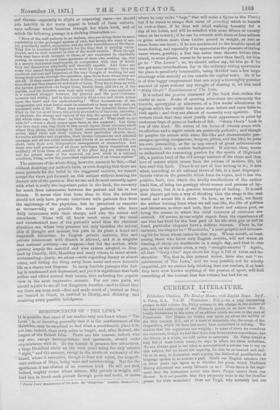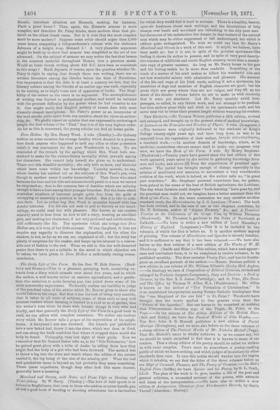CURRENT LITERATURE.
Bibliotheca Classico. The Iliad of Homer, with English Notes. By F.. A. Paley, M.A. Vol. II. (Whittaker ; Bell.)—In a very interesting preface to this volume Mr. Paley returns to the charge in the matter cla the data and authorship of the Rework poems as we have them. He totally diebelioves in the story of an edition which we owe to the care Of Pisistratus. Our Houser, he thinks, was made up about the middle of the fifth century B.O., out of a mass of materials, viz., the songs of the rhapsediets, which till then had never been committed to writing. We. confess that his arguments are weighty ; to some of them we ourselves. see no answer, though we fool that there may be an answer somewhere ; but the theory, as a whole, we still refuse to entertain. Mr. Paley arrays a long list of word-terms which, ho says in offeet, are sham archaisms- We are always glad to see what so accomplished a scholar has to say on this subject, but we doubt his capacity, let him be as learned and skil- ful as he may, to determine such a point, the dialectical peculiarities of language spoken in so remota a past. Could our English scholars two. or three years ago agree as to whether the poem which Professor Morley discovered was really Miltouic or no ? Then there is the argu- ment that the dramatists never take their Trojan scones from our Homer. Is it not possible that they purposely went to the less familiar. poems for their materials? Does not Virgil, who certainly had our
Homer, introduce allusions not Homerie, making, for instance, Paris a great boxer ? Then, again, the Homeric armour is more complex, and therefore Mr. Paley thinks, more modern, than that pic- tured on the oldest Greek vases. But is it true that the most complex must be more modern ? Suppose some critic should argue thus 2,000 years hence, comparing a Lifeguardsman's cuirass with the elaborate defences of a knight temp. Richard I.! A very plausible argument might be built up to show that armour was simplified as the art of war advanced. On the subject of armour we may notice the fact that bronze is the common material throughout Homer, iron a precious metal. Would an Ionic Greek writing about 450 B.C. have been so consistent in this usage ? Much depends, of course, upon the question whether Mr. Paley is right in saying that though there was writing, there was no written literature among the Greeks before the time of Herodotus. Our impression is that the date is at least a century too late, that the literary culture among the Greeks of an earlier age was such, especially in its variety, as to imply some sort of apparatus of books. The illegi- bility of the letters on the vases is no argument. Tho accomplishment of writing was limited to professional scribes, and would be imitated with the greatest difficulty by the potter when he had occasion to use It. One might easily find English pottery of recent date with most clumsily-shaped inscriptions. Mr. Paley's power as an interpreter of the text stands quite apart from any question about his views on author- ship, dm. We gladly repeat an opinion that was expressed in reviewing at length the first volume of the "Iliad," that it is of the very highest order. As far as this is concerned, the young scholar can find no better guide.



































 Previous page
Previous page